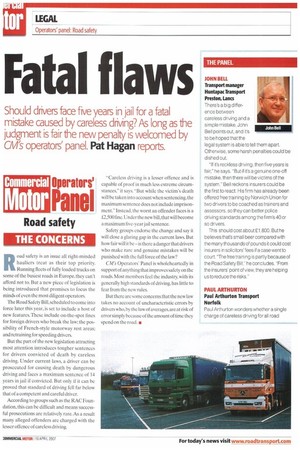Fatal flaws
Page 40

If you've noticed an error in this article please click here to report it so we can fix it.
Should drivers face five years in jail for a fatal mistake caused by careless driving? As long as the judgment is fair the new penalty is welcomed by CM'S operators' panel. Pat Hagan reports.
Road safety THE CONCERNS
Road safety is an issue all right-minded hauliers treat as their top priority. Running fleets of fully loaded trucks on some of the busiest roads in Europe, they can't afford not to. But a new piece of legislation is being introduced that promises to focus the minds of even the most diligent operators.
The Road Safety Bill,scheduled to come into force later this year, is set to include a host of new features. These include on-the-spot fines for foreign drivers who break the law; the possibility of French-style motorway rest areas; and retraining for speeding drivers.
But the part of the new legislation attracting most attention introduces tougher sentences for drivers convicted of death by careless driving. Under current laws, a driver can be prosecuted for causing death by dangerous driving and faces a maximum sentence of 14 years in jail if convicted. But only if it can be proved that standard of driving fell far below that of a competent and careful driver.
According to groups such as the RAC Foundation, this can be difficult and means successful prosecutions are relatively rare. As a result many alleged offenders are charged with the lesser offence of careless driving. "Careless driving is a lesser offence and is capable of proof in much less extreme circumstances," it says. "But while the victim's death will he taken into account when sentencing, the maximum sentence does not include imprisonment." Instead, the worst an offender faces is a £2,500 fine. Under the new bill, that will become a maximum five-year jail sentence.
Safety groups endorse the change and say it will close a glaring gap in the current laws. But how fair will it be —is there a danger that drivers who make rare and genuine mistakes will be punished with the full force of the law?
CM's Operators' Panel is wholeheartedly in support of anything that improves safety on the roads. Most members feel the industry, with its generally high standards of driving, has little to fear from the new rules.
But there are some concerns that the new law takes no account of uncharacteristic errors by drivers who, by the law of averages, are at risk of error simply because of the amount of time they spend on the road. •
























































































































































































































